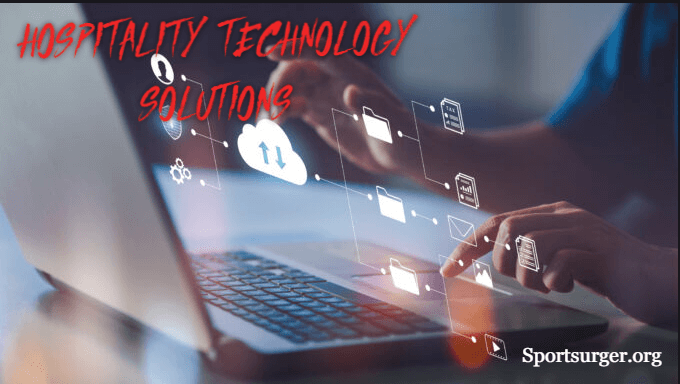Introduction
The hospitality industry has always been driven by guest experience. However, in recent years, hospitality technology solutions have become the backbone of modern hotels, resorts, and restaurants.
From mobile check-ins to AI-powered concierge services, technology is reshaping how businesses operate, interact with guests, and maintain efficiency.
For hotels and restaurants navigating a competitive marketplace, the adoption of smart technologies is no longer optional—it’s essential.
In this article, we’ll dive deep into the role of hospitality technology solutions, the benefits they bring, the challenges of implementation, and the future innovations that will define guest experiences.
What Are Hospitality Technology Solutions?

Hospitality technology solutions refer to digital tools, systems, and platforms designed to improve guest services, streamline operations, and enhance decision-making in the hospitality sector. These solutions integrate hardware, software, and cloud-based services to optimize:
- Guest interactions (reservations, check-ins, concierge)
- Operational management (staffing, housekeeping, food & beverage services)
- Revenue management (pricing, upselling, demand forecasting)
- Marketing and personalization (CRM, loyalty programs, targeted offers)
In short, hospitality technology solutions are the bridge between guest expectations and service delivery excellence.
The Importance of Hospitality Technology Solutions in Today’s Market
Rising Guest Expectations
Guests expect seamless, personalized, and tech-driven experiences. Whether it’s booking a room via mobile or requesting service through a smart device, technology has become a key differentiator in customer satisfaction.
Competitive Advantage
Hotels and restaurants that adopt cutting-edge hospitality technology solutions stand out in a crowded marketplace, offering smoother operations and better guest engagement.
Data-Driven Decision Making
Hospitality businesses now leverage real-time data to improve pricing strategies, forecast demand, and tailor marketing campaigns.
Types of Hospitality Technology Solutions
1. Property Management Systems (PMS)
A PMS is the backbone of hotel operations, allowing management of reservations, room inventory, check-ins, and check-outs. Modern cloud-based PMS also integrates with other hospitality solutions seamlessly.
2. Customer Relationship Management (CRM) Systems
Hospitality CRMs centralize guest data to personalize services and improve loyalty programs. They help build long-term relationships with repeat customers.
3. Mobile Technology
- Mobile apps for booking and check-ins
- Mobile key cards for room access
- Contactless payment solutions
4. Artificial Intelligence and Chatbots
AI-powered chatbots provide 24/7 guest support, handling common queries, while AI systems personalize recommendations and optimize pricing strategies.
5. Internet of Things (IoT)
Smart rooms with IoT devices allow guests to control lighting, temperature, and entertainment with voice or mobile apps.
6. Point-of-Sale (POS) Systems
In restaurants and hotels, POS systems streamline billing, orders, and payment, while integrating with inventory management tools.
7. Revenue Management Systems (RMS)
RMS helps hotels forecast demand, set optimal pricing, and maximize revenue by analyzing booking patterns and market conditions.
Benefits of Implementing Hospitality Technology Solutions
Improved Guest Experience
- Personalized services tailored to guest preferences
- Faster and seamless check-in/check-out
- Contactless experiences for convenience and safety
Operational Efficiency
- Automation of repetitive tasks reduces workload
- Real-time tracking of housekeeping and maintenance
- Better communication across departments
Increased Revenue
- Dynamic pricing strategies with revenue management software
- Cross-selling and upselling opportunities
- Stronger loyalty programs that increase repeat bookings
Data Security and Compliance
Modern hospitality solutions ensure compliance with data privacy regulations while protecting sensitive guest information.
Challenges of Implementing Hospitality Technology Solutions
While the benefits are clear, businesses face several challenges when adopting these technologies:
- High Initial Investment – Advanced systems can be costly for smaller hotels.
- Integration Issues – Legacy systems may not integrate seamlessly with new platforms.
- Training Needs – Staff must adapt to new digital workflows, requiring training and support.
- Cybersecurity Risks – With greater reliance on technology comes increased exposure to cyber threats.
- Guest Adaptation – Not all guests are comfortable with fully digital experiences.
Real-World Examples of Hospitality Technology Solutions
- Marriott Hotels use mobile apps for check-in, digital room keys, and room service requests.
- Hilton’s Connected Room allows guests to personalize room settings via mobile devices.
- Restaurants utilize QR code menus and AI-driven kitchen management systems to enhance efficiency.
These examples demonstrate how technology can deliver both operational excellence and superior guest experiences.
The Future of Hospitality Technology Solutions
Hospitality technology is continuously evolving, and the next decade promises even more exciting innovations:
- AI-Enhanced Personalization: Real-time customization of guest services.
- Robotics: Robots for room service delivery and cleaning tasks.
- Augmented Reality (AR) and Virtual Reality (VR): Virtual tours of hotels, AR-powered dining experiences.
- Blockchain: Secure payments and identity verification.
- Sustainability Tech: Energy-efficient smart rooms and eco-friendly systems.
Best Practices for Implementing Hospitality Technology Solutions
- Assess Business Needs – Identify pain points before choosing technology.
- Choose Scalable Solutions – Select platforms that grow with your business.
- Prioritize Guest-Centric Tools – Focus on technologies that improve guest satisfaction.
- Invest in Training – Ensure staff are comfortable using new systems.
- Maintain Strong Cybersecurity – Protect guest data with robust security protocols.
Conclusion
The hospitality industry is at a pivotal point where guest expectations, operational demands, and technological advancements intersect. Hospitality technology solutions empower businesses to stay competitive, improve guest satisfaction, and achieve operational excellence.
By embracing these tools strategically, hotels and restaurants can create memorable guest experiences, optimize their resources, and future-proof their operations. The businesses that act now will be the ones shaping the next generation of hospitality.
FAQs
- What are hospitality technology solutions?
They are digital systems and tools used by hotels, resorts, and restaurants to improve guest services, streamline operations, and enhance revenue management. - How do hospitality technology solutions improve guest experiences?
They allow guests to enjoy seamless check-ins, personalized services, and convenient digital interactions, creating a more memorable stay. - Are hospitality technology solutions expensive to implement?
Costs vary, but cloud-based and modular solutions make advanced technologies more affordable for small and mid-sized businesses. - What are the biggest challenges of adopting hospitality technology solutions?
Challenges include high investment costs, staff training requirements, integration with existing systems, and cybersecurity risks. - What is the future of hospitality technology solutions?
Future trends include robotics, AI-driven personalization, AR/VR experiences, blockchain security, and sustainability-focused innovations.

